#Rudolf Berthold
Text
Aces and their pets
Most people know of Moritz, Manfred von Richthofens beloved Great Dane (he was most likely a mutt but MvR swore up and down he was a purebred). After MvRs death Moritz got taken care of by Manfreds old friend Alfred Gerstenberg.
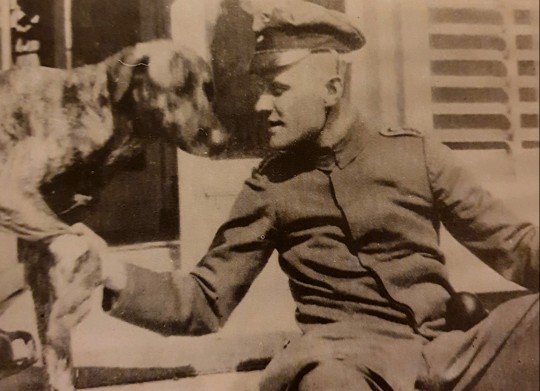
But there are several other pets (primarily dogs) that deserve a mention as well as many of them accompanied their owners to the front.
One of them is Max Immelmanns Great Dane Tyras. Immelmann found him in an animal shelter and his name is technically a pun, as Max named him after the place he got him from (Tierasyl = Tieras = Tyras, which was also the name of Otto von Bismarcks dog). Tyras was very loved, he was regularly sketched by Immelmann and was allowed to sleep on the bed. Tyras most likely stayed with Immelmanns family after his death.
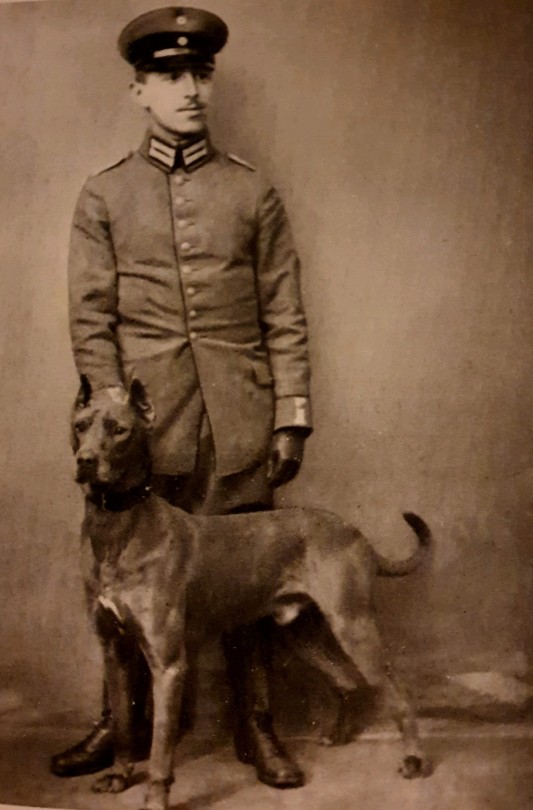
The great Oswald Boelcke also had dogs. Besides horses they were his favourite animals. Shortly before the war broke out he got Ibi, an Airedale Terrier. He left Ibi at home during the war. Missing his loyal companion he got himself a German Shepherd named Wolf.
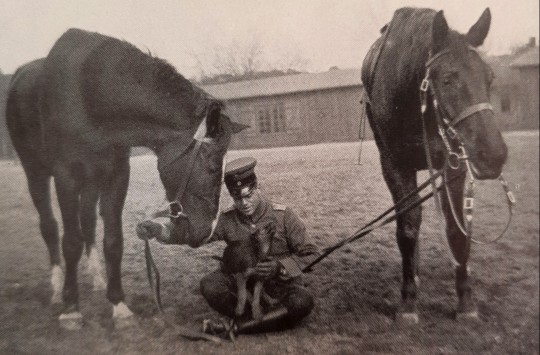
Rudolf Berthold got gifted a small white terrier by comrades, name unfortunately unknown. But important enough to be included in the Sanke card.
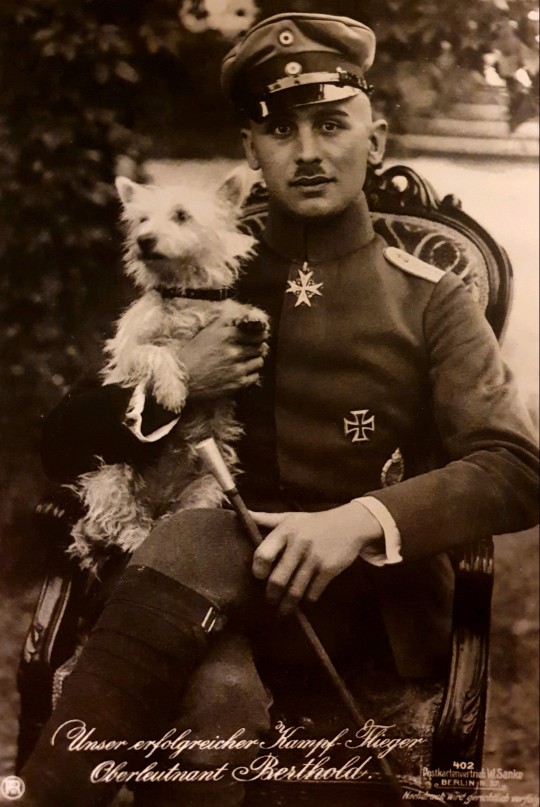
Ernst von Althaus' beloved dog Mousse was with him during the whole war. He seems to be a type of hunting breed. With him in the picture is Otto Bernert with a Jack Russel.
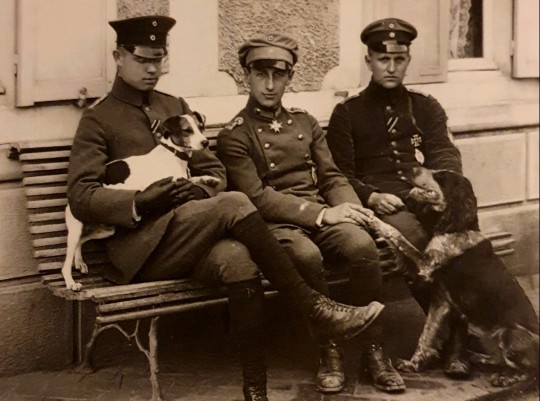
Josef Jacobs also brought his dog Rolf to the front with him.
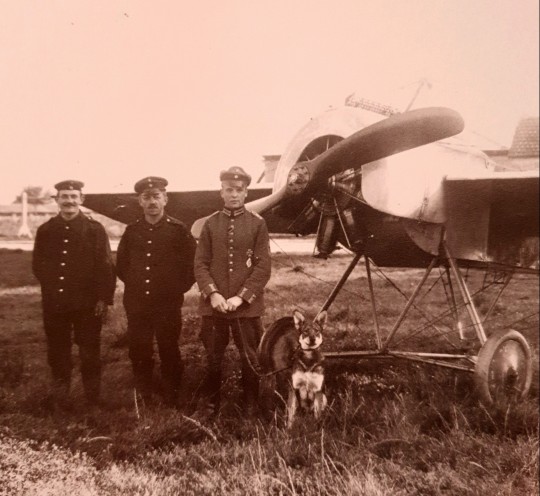
Heinrich Gontermanns dog also had the honour of being included in the Sanke card.
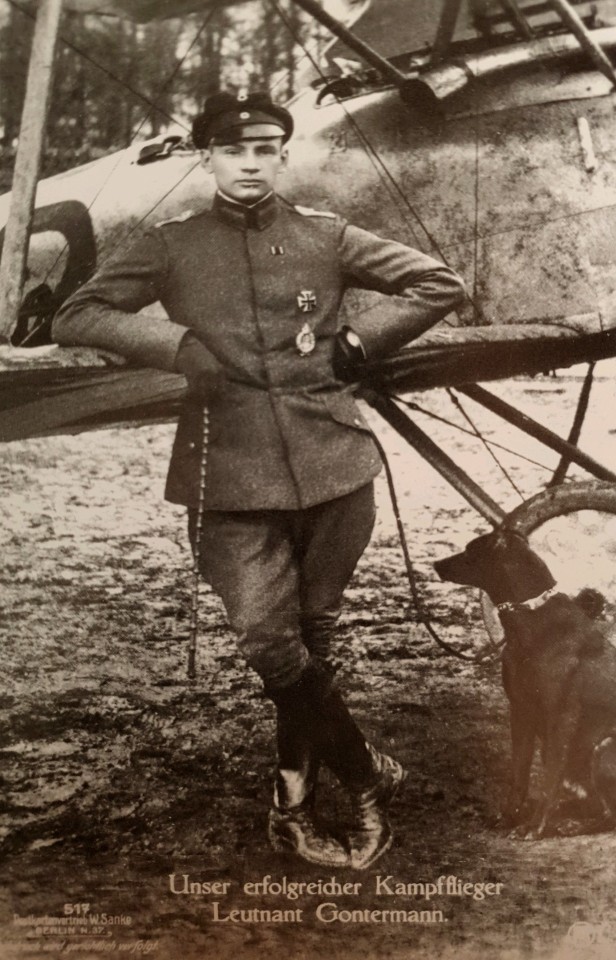
Richthofens former flight companion Graf Erich von Holck also had a small dog, who he took with them in the airplane during their patrols over Russia. That tough doggy survived the incident where they flew over a burning town and had to do an emergency landing but then got lost on the way back. Holck apparently was also a cat lover. There are several pictures of pilots (from all countries) with lion cubs, so there seemed to be a trend.

Speaking of rather curious choices of animal companions, Ernst Udet and his comrades entertained a monkey named Betty. Unfortunately, I can't find the picture right now (does anyone have it?).
Ernst Udet tells the story of his comrade Wilhelm Klinkermann whose dog always waited right at the flight strip until his owner returned. On the day of his death the dog was very nervous and when Klinkermann didn't return, they had to force the dog into the car to take him to his family. He did not want to leave without his owner.

Walter von Bülow-Bothkamp with his dog Tönnes.

And here some more (I'm not sure if these dogs belong to whom they are pictured with):
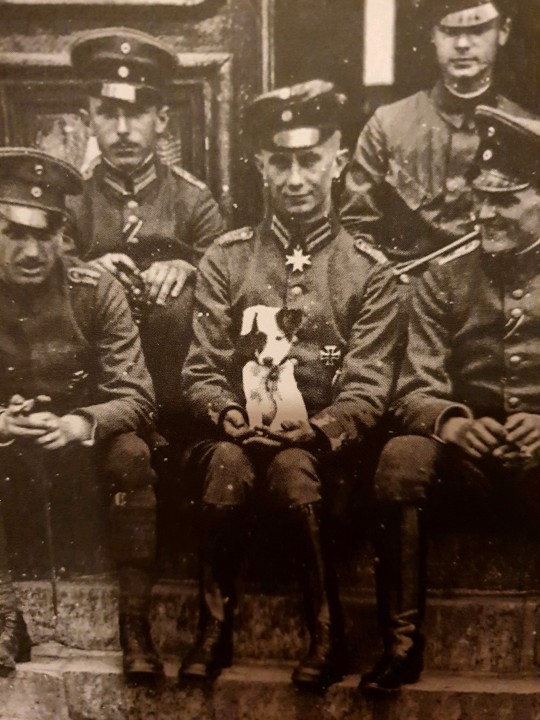


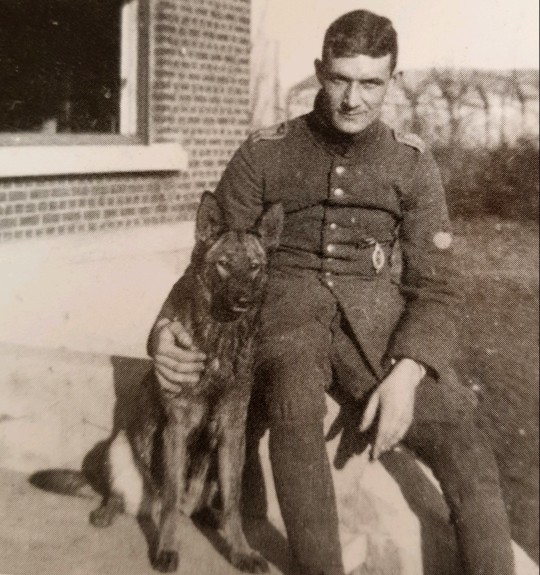
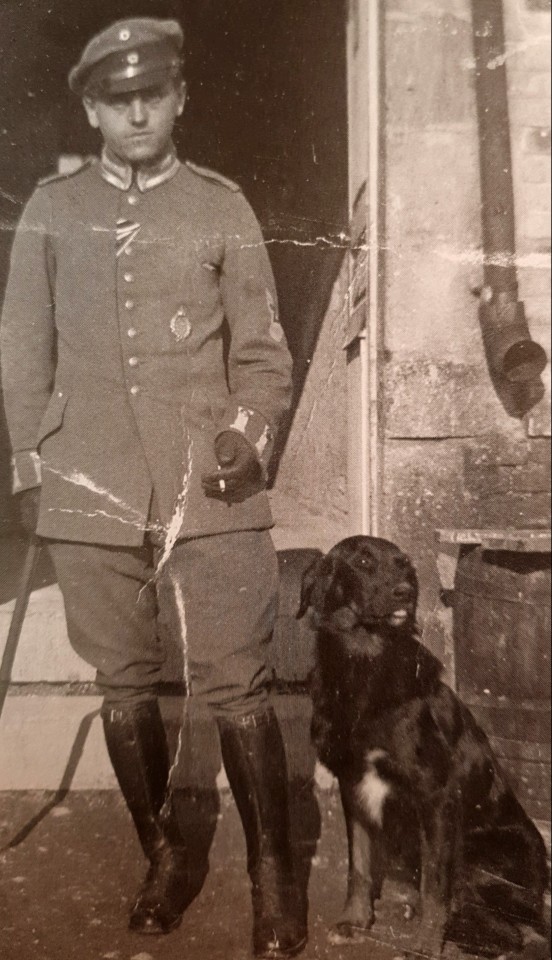
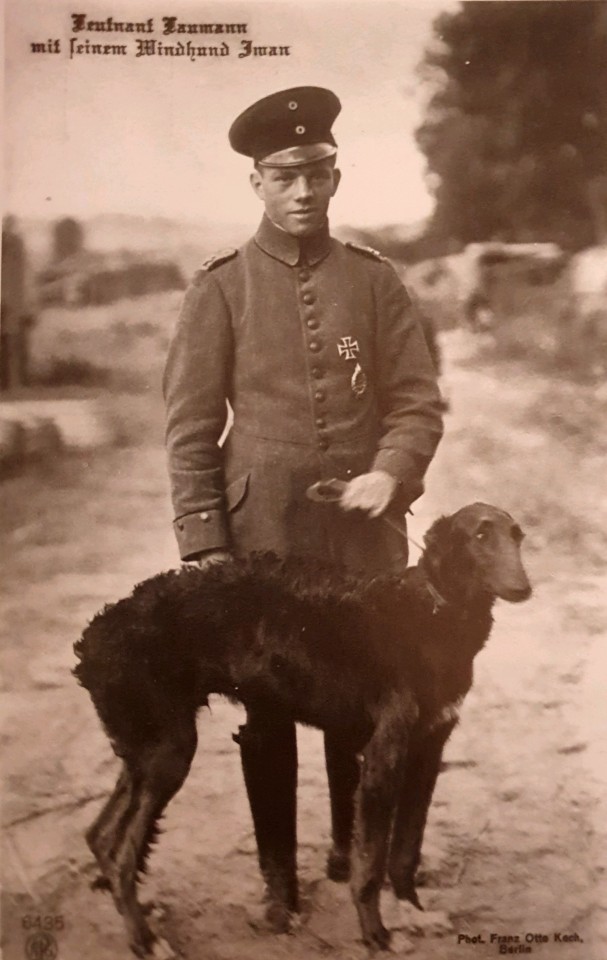
#Man´s best friend#Manfred von Richthofen#Max Immelmann#Oswald Boelcke#Ernst von Althaus#Josef Jacobs#Heinrich Gontermann#Ernst Udet#Rudolf Berthold
63 notes
·
View notes
Text
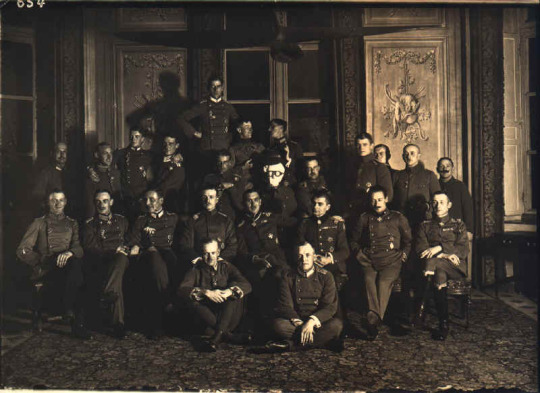
I think about this picture a lot .
(This is Jasta 4 or Jasta Vaux as I'd like to call them , there's a few recognisable members here like Walter Höhndorf, second to the left bottom, Rudolf Berthold and Hans-Joachim Buddecke in the middle, Wilhelm Frankl beside Buddecke and Ernst Freiherr von Althaus beside Frankl, you also have Otto Bernert behind the two)
#i wish there's a way clearer version#ww1 pilots#ww1#aviation#hans joachim buddecke#rudolf berthold#otto bernert#walter höhndorf#wilhelm frankl#ernst freiherr von althaus
18 notes
·
View notes
Text
It is getting serious!
30 July 1914
The mobilization order has just come. All officers are recalled to their regiments by telegraph. Boelcke and I leave. I still have my mobilization order as an observer. The comrades looked sadly after us. They have to stay behind at school to finish training. But with this operation it can still take months, and by then everything will probably be over? … I'm supposed to report to Großenhain. I interrupt my journey in my garrison in Wittenberg. The streets were black with people. My regiment had to leave the next day: it belongs to the flying brigade. I was only allowed to stay a few hours. I say goodbye to everyone. Who knows if I will ever see any of the dear old comrades again ... Everyone is so sure about a victory! I love flying and yet, what I would have given to be able to go out with my old, dear regiment! O proud regiment, you will fight true to your principles, true to your traditions! You are, after all, a Margravian regiment, a true German core troop, and you have never failed! ... The glass of champagne that I quickly downed as I said goodbye to my comrades tasted quite bitter, a few furtive tears had fallen in ... .
1 August 1914
The farewell to my garrison was still trembling inside me when I arrived in Grossenhain. The journey was terrible. The general state of war moved everything. The trains were overcrowded. I was glad that I was able to come at all. How I longed for my comrades! But the sense of duty drove away all softness, now it was time to be hard on yourself! I didn't see anxious faces anywhere, only seriousness and determination: suddenly we were like one big family: the strangeness that usually hangs over people who don't know each other was completely stripped away. You talk to each other as if you have known each other for a long time. The personal disappears, the community comes to the fore. National sentiment had finally broken through: the love of Germany! O glorious fatherland, you will not perish as long as you still have such sons, as long as you are still able to awaken such deep feelings in everyone! Because now everything is understood, therefore, despite all the excitement, an uplifting calm over everything! At the overcrowded stations, everything waits patiently for hours, No murmur disturbs the calmness. Here in Großenhain everything is deserted and quiet. I still couldn't sleep in my hotel room ... I leaned out of the window. A glorious starry sky arches over the outwardly quiet earth. I dreamt: I let my whole life pass me by. At such an hour, everyone thinks with particular fervour of everything they love. My parents and siblings, I have not seen them! They won't sleep either and be thinking of me now too! But they know that I now belong only to my country, to my people! My home village, my beautiful forest! How I love it all! ... Where will fate throw me now? Will we pilots live up to the challenge? We still have too little practical experience in flying, we are still too young ... The stars are fading. Day is coming. Life begins again ... Ringing of the bells! Seriously admonishing and yet also liberatingly joyful ... Densely packed crowds stream to the church. The German people feel their God again, know that only in God rests true human strength, that faith alone gives strength to weak people in times of need. We will be strong, for God and the law are with us! ... A battalion of infantry passes by. What a joyful and refreshing sight! Singing, flowers in their buttonholes, bayonets flashing on their rifles! Invincible in hope! The market fills up. Men of older age with suitcases in their hands: the last reserves of the Landwehr! Eyes sparkling with joy despite the seriousness. The external differences disappear. March off. Singing. Soldiers ... There is a knock, I snap out of my pondering. My orderly! Duty calls.
7 August 1914
I'm writing this in the compartment. Finally we have finished loading. I boarded the tran two hours ago, I couldn't wait. There are a lot of people outside and comrades who are leaving after us. We're the first of the Fliegertruppen to get close to the enemy, hurray! I almost forgot: my old regiment, my dear 20s, are supposed to have fought heavy battles before Liège, heavy losses! Poor, good fellows! ...
Two days we are on the train, endlessly long and yet it is beautiful! Everywhere we are cheered on. There are flowers and refreshments everywhere. Everyone wants to give us something, even the poorest one doesn't want to be left behind ... We ate and drank and smoked our way through Central and West Germany in the truest sense of the word ... Finally we are approaching our final destination. Hours of waiting before the entrance. Military transport after military transport waiting to be unloaded. The evening sky was blood-red. The muffled rumble of the guns in front of Liège gave us an inkling of the hard work that was about to begin.
5 notes
·
View notes
Text

1918 08 10 Amiens, Dogfight RAF 32 Sqn vs Jasta 15 - Peter Dennis
repost better colors
The air operations in support of the ground battle reached their zenith of intensity on 10 August. By this time the RAF effort was shifting back towards the original intention of interdicting the German lines of communications by attacking the key railway centres through which any reinforcements would need to transit. Twelve DH9s from 27 and 49 squadrons were tasked with bombing Peronne railway station escorted by SESas of 32 Squadron and Bristol Fighters of 62 Squadron. As they approached the target from the south-west they were attacked by 14 Fokker DVlls from Jasta 15 led by the ace commander of JG II, Rudolf Berthold. In order to maintain the advantage given by a higher position both attackers and defenders normally split their force with one element placed above the other to act as 'top cover'. Once under attack a defender would attempt to execute a climbing turn towards the attack to bring his own guns to bear, prevent the attacker form getting on his tail and to get above the attacker. As a consequence each combat soon degenerated into a rolling maul of aircraft climbing and turning in search of a killing shot. Flying with 32 Squadron was Second Lieutenant J. 0. Donaldson of the USAS on attachment to the RAF. Donaldson was flying as top cover as 'B5' in SESa E5939 when: " "observed 9 Fokker biplanes, at 13000ft over Peronne, at 1130hrs dive on 3 SE5a). Pilot coming to their assistance, fired 150 rounds into first EA [enemy aircraft) at close range, EA turned over on its back, and went down in a flat spin, and was observed to spin, out of control about 10000ft. Four Fokker biplanes dived on Pilot, who made a climbing turn, firing 50 rounds into second EA without results. Pilot did half roll and dived again, two EA continued to follow, pilot then made another climbing turn, firing 50 rounds into EA without result. Pilot turned and dived under some Bristol Fighters ". Combat report, Second Lieutenant J. 0. Donaldson, 10 August 1918
A passing patrol from the elite 56 Squadron joined in the melee to stack the odds against Jasta 1 5, however, the powerful DVlls were faster and more agile than their opponents and exacted a severe toll from the RAF as one DH9 and four fighters were shot down for the loss of only one German aircraft. Unfortunately for JG II the loss was Berthold who was seriously injured after having his aircraft shot out of control. With no one able to confirm Donaldson's victim's crashing he was only credited with a 'shot down out of control' rather than a kill. Donaldson's luck ran out three weeks later on 1 September at Cambrai where he became the 11th victim of Leutnant Theo Quandt of Jasta 36 and was taken prisoner.
18 notes
·
View notes
Video
vimeo
THE BEGINNING. Kunst in Österreich 1945 bis 1980. #2 Der Phantastische Realismus und Friedensreich Hundertwasser from CastYourArt on Vimeo.
Am Beginn der Kunst in Österreich nach der Gewaltherrschaft der Nationalsozialisten und dem Krieg steht die »Wiener Schule des Phantastischen Realismus«, die zunächst unter dem Namen »Wiener Surrealismus« firmierte. Dazu gehören Küntler wie Arik Brauer, Ernst Fuchs, Rudolf Hausner, Wolfgang Hutter und Anton Lehmden, die den Kern der Gruppe bilden. Überraschend wahrscheinlich für einige die ihn kennen, ist dass auch Arnulf Rainer Arbeiten fertigte, die dieser Richtung zugerechnet werden. Die Künstler dieser Gruppe suchten mit ihrer Kunst eine Neuorientierung weg vom pathetischen Heroikgehabe und den falschen Idyllen der nationalsozialistischen Kunst hin zu einer Öffnung für die internationalen Strömungen, insbesondere den Surrealismus, jedoch können sie nicht als Nachfolger des französischen Surrealismus gelten, denn ihr Zugang war wesentlich analytischer und von einem tiefgehenden Denken über die Bedingtheit der Existenz in der Welt und von der eigenen Situation geprägt.
Friedensreich Hundertwasser wiederum kann als jener österreichische Nachkriegskünstler bezeichnet werden, dem schon früh internationale Anerkennung und Erfolg zuteil wurde. Er hat ein äußerst solitäres Werk geschaffen, das Elemente einer Weltsicht und -reflexion beinhaltet - beispielsweise der Ganzheitlichkeit und auch des Umweltbewusstseins - die noch heute aktuell ist und damals ihrer Zeit weit voraus war.
Im CastYourArt Filmbeitrag stellen die beiden Kurator*innen Berthold Ecker und Elisabeth Dutz den Phantastischen Realismus und die Kunst Hundertwassers vor, denen jeweils eigene Bereiche der ALBERTINAmodern Ausstellung "The Beginning. Kunst in Österreich 1945 bis 1980" gewidmet sind.
ALBERTINAmodern | albertina.at
Eine CastYourArt Produktion | castyourart.com
1 note
·
View note
Text
Las reflexiones geopolíticas de Erwin Kern

Por Maxim Medovarov
Traducción de Juan Gabriel Caro Rivera
Erwin Kern fue asesinado cobardemente por un policía alemán en el castillo de Zaalek (siglo XII) el 17 de julio de 1922. Pero, ¿quién era este hombre? Kern es muy conocido por haber sido uno de los miembros fundadores de los cuerpos combatientes (Freikorps), siendo líder de la legendaria Brigada de Marines Erhardt, considerada por muchos como el baluarte de la Revolución Conservadora que primero enfrentó a la República de Weimar y luego a Hitler. Sin embargo, Kern no sólo contaba con una gran experiencia bélica, sino que también fue un consumado geopolítico que se opuso tanto a la versión liberal como nazi del continentalismo europeo. Lamentablemente, las reflexiones de Kern nunca llegaron a desarrollarse por su prematura muerte (tenía 24 años cuando murió), pero las lecciones que nos deja su muerte cien años después no dejan de ser relevantes. El pensamiento de Erwin Kern sería tan poco interesante como sorprendente de no haber llegado a las conclusiones a las que llegó en 1922. Pero lo más interesante de todo fue el proceso de maduración que atravesaron sus ideas tal y como fueron descritas por su alumno, y en parte hagiógrafo, el famoso Ernst von Salomon.
Kern era teniente de la marina alemana cuando sucedió la Revolución de Noviembre que destruyó el Imperio Alemán y que según él provocó su muerte interior. Sobre esto dijo lo siguiente: “Me disparé en la frente el 9 de noviembre de 1918 tal y como me lo ordenaba mi código de honor. Desde ese entonces estoy muerto y ya no soy yo quien vive, sino un desconocido”. A partir de ese día, Kern solo vivió de forma impersonal su vida con tal de cumplir con el deber que se le había asignado. Durante el mes de noviembre los intelectuales, obreros y el lumpen comenzaron atacar a los soldados y oficiales alemanes, mientras tanto, todo discurso militarista y patriótico era despreciado en público. Uno de los más estrechos colaboradores de Kern, el capitán Rudolf Berthold, considerado como uno de los mejores pilotos de la Primera Guerra Mundial, fue descuartizado por obreros de izquierda en las calles de Hamburgo durante el putsch de Kappa del 15 de marzo de 1920 y sobre el que ya hemos escrito alguna vez (1). Esta fue una de las razones por las que los Freikorps lucharon codo con codo con las tropas rusas de Bermondt-Avalov en contra de los nacionalistas letones de Ulmanis (títeres de los británicos) y los bolcheviques Stutka. Las terribles escenas de tortura y masacre de prisioneros, junto con las burlas hacia sus compañeros de armas caídos, marcaron profundamente a Kern durante sus días de batalla en Riga. Desde entonces se dio cuenta que no libraba una “guerra contra los bolcheviques”, sino “contra Inglaterra”. Los Freikorps ruso-alemanes se habían convertido en la vanguardia del continente eurasiático en un momento en que la flota británica bombardeaba Letonia. Kern tuvo que retirarse, pero poco después volvería a sus andanzas, esta vez en Silesia, llamado por muchos como el “Donbass alemán”, invadido por los polacos. En ese entonces, la Entente promovió una serie de “referendos” en esta región llena de minas de carbón, por lo que los Freikorps alemanes y los militares polacos se apresuraron a capturar la mayor cantidad de asentamientos y lugares estratégicos de la zona unos días antes de que se llevara a cabo la elección. El débil gobierno de la República de Weimar se negó a ayudar a los voluntarios alemanes que en ese entonces combatían en Silesia. Por lo tanto, la defensa de las regiones alemanes se convirtió en un fenómeno desde abajo. La Brigada Erhardt cantaba: “¡Freikorps, voran! Die Grenze brennt!” (¡Cuerpos combatientes, adelante! Las fronteras arden). Realmente las fronteras ardían: los hombres de Kern pasaron ametralladoras desmontadas a través de las aduanas de Silesia y combatían a veces semidesnudos, sin uniformes, con los polacos. La captura por parte de los alemanes de la estratégica montaña de Annaberg, análoga en importancia al pico de Saur-Grave en el Donbass, decidió el resultado de la batalla e “hirió de muerte a los combatientes polacos”. No obstante, los políticos berlineses, al servicio de Versalles y su “política pactista”, ignoraron tal hazaña e hicieron a un lado a los defensores de la patria. En Silesia, Kern fue nuevamente testigo de cómo los polacos no solo eran armados por los franceses, sino, especialmente, por los británicos y eso a pesar de que estos últimos se referían de forma muy despectiva a los polacos, considerándolos únicamente como carne de cañón para destruir a Alemania.
Fue a partir de ese momento que Erwin Kern comenzó a reflexionar seriamente sobre el atlantismo y la política de Gran Bretaña. El verdadero enemigo de Alemania era Gran Bretaña, mientras que Rusia, independientemente de su ideología comunista, era el mejor aliado. Durante ese período de tiempo, Kern experimentó una profunda conmoción espiritual, una especie de metanoia, que se vio reforzada por la pérfida política de Francia hacia Alemania. Francia apoyaba tanto el chovinismo polaco en el Este como el separatismo de los liberales alemanes renanos en el Oeste. Resulta difícil de imaginar actualmente, pero entre los alemanes de Westfalia, especialmente en Colonia y Maguncia, había muchos traidores iguales a los “ucranianos” de hoy y que estaban dispuestos a luchar por la independencia de la “nación del Rin” con el apoyo de Paris. El más famoso de estos separatistas era Konrad Adenauer, el canciller alemán que tres décadas después convertiría a la Republica Federal de Alemania en un vasallo de Estados Unidos y las potencias occidentales al adoptar el atlantismo como política oficial alemana. Kern creó la “Organización de los Cónsules” (O.K.) con tal de combatir el separatismo renano y restablecer el control directo de la Republica de Weimar en el Oeste, preservando así la integridad territorial de Alemania. Fue en ese momento en que se produjo un segundo y terrible cambio espiritual dentro de Kern. Este dejó de cuestionar a sus enemigos externos y comenzó a cuestionar a su gobierno y así mismo: “Nunca tendremos éxito en nuestras empresas. Hemos marchado de un lado para el otro restableciendo el orden en todas partes porque queremos ser libres como el viento. Marchamos hacia el Este buscando capturar Varsovia y conservar Riga, llevando en alto la bandera de Berlín a todas partes. Salvamos la Alta Silesia para luego ver como era destrozada posteriormente”. Tales palabras podrían ser pronunciadas por los combatientes rusos contemporáneos, pues los lugares de los que hablamos son prácticamente los mismos donde hoy se desenvuelve el conflicto.
Hasta ahora, Erwin Kern solo había luchado contra la “quinta columna” dentro de Alemania, pero a partir de este punto comprendió que existía un fenómeno diferente y mucho más peligroso, la “sexta columna” encabezada por el ministro de Asuntos Exteriores Walter Rathenau, que en 1922 estaba a cargo de todos los sectores económicos estratégicos de Alemania. Es importante dejar claro lo siguiente: es un error creer que la “sexta columna” son traidores disfrazados que rinden pleitesía al Estado, mientras que la “quinta columna” son estos mismos traidores, pero de forma abierta. Esta es una definición demasiado simplista y, por lo tanto, errónea. Kern llegó a la conclusión de que la “sexta columna” también amaba a Alemania a su manera, deseaba su bienestar, quería hacerla rica y fuerte. Rathenau era un patriota alemán sincero, aunque no era de origen alemán y ni siquiera era cristiano. Rathenau también sintió la misma indignación de Kern por la insolente invasión polaca de las tierras alemanas y envió a la Entente muchas quejas sobre este asunto. Pero, si esto es así, ¿entonces por qué la “la sexta columna”, que no son traidores en el sentido lato de esta palabra, es peligrosa? Kern encontró la respuesta a esta interrogante después de leer los libros de Rathenau y escuchar sus conferencias públicas: el objetivo de Rathenau era pactar con las élites de la Entente con tal de integrar a Alemania en el sistema atlántico occidental y destruir poco a poco la identidad alemana y su forma de ser (Sonderweg). A diferencia de los separatistas renanos y los polacos, que intentaban arrancarle a Alemania partes de su territorio para luego ponerlas al servicio de la Entente, la “sexta columna”, capitaneada de forma brillante por Rathenau, quería hacer lo mismo, pero de forma pacífica con todo el país. Tal objetivo sin duda dejaba como un juego de niños las pataletas superfluas de la “quinta columna” e incluso el atlantismo de los polacos. Lo que Rathenau quería era destruir geopolíticamente a Alemania (algo que más tarde harían Adenauer, Kohl y Merkel, después del fallido intento de Hitler de negociar con los británicos y el atlantismo una alianza dirigida contra Rusia) y lo habría conseguido, con el apoyo de Stresemann, si no hubiera sido por Kern y la O.K.
En un primer momento Erwin Kern fue reacio a las invectivas. Apeló a sus amigos, a la paciencia y a los largos años de formación que su espíritu había sufrido: “Abandone las pequeñeces cotidianas para prepararme para los grandes acontecimientos”. Kern no era ni un nacionalista de campanario ni un chovinista. Soñaba con el día en que todas las patrias serian libres y, además, con “la victoria del espíritu alemán en toda la tierra”. Los atlantistas, comandados por Rathenau, por el contrario, soñaban con la victoria del espíritu mundialista sobre toda la tierra y que Alemania ocupara un lugar digno dentro de ese orden mundial. El plan de Rathenau significaba el triunfo de la economía y el dinero sobre el espíritu y el acero, algo que Kern no estaba dispuesto a permitir: “Jamás debemos someternos a la peor de las tiranías: la económica. Es completamente ajena a nuestra esencia y jamás seremos realmente fuertes bajo su amparo. Esta tiranía es intolerante con los demás porque es demasiado plebeya y se encuentra demasiado abajo. Este es un hecho que podemos comprobar únicamente viendo los hechos. Nunca podremos estar de acuerdo con quienes niegan la jerarquía y los rangos”. Kern sinceramente esperaba poderse reconciliar y llevar bien con Rathenau. Una vez confesó: “La reconciliación, cuando hay un camino lleno de sangre entre las partes, sólo puede tener lugar cuando los combatientes realizan un acto de suprema valentía. ¿Cómo van a respetarse dos adversarios que no reconocen el valor del otro y que no entienden las diferencias entre ambos? Aquellos que apuestan por la reconciliación lo hacen mediante un acto de suprema valentía”. Sin embargo, la decisión del gobierno alemán de negociar humillantemente en Génova con las potencias occidentales, solicitando la supresión de las reparaciones y las sanciones por considerarlas desventajosas para la propia Entente, causó en Kern una gran conmoción. La reconciliación se había vuelto imposible. Kern llegó a la conclusión de que los políticos alemanes solo querían llegar a un “acuerdo”: “Hablan el lenguaje del enemigo y piensan usando sus conceptos. Su principal argumento una y otra vez es que perjudicar a la economía alemana causa grandes perjuicios a la economía mundial. Su gran ambición no es otra que integrarse al sistema creado por las grandes potencias de Europa y Occidente. Y cuando me refiero a ‘Occidente’ estoy hablando de todos aquellos que se han sometido a la tiranía económica con tal de fortalecerse”.
Estas palabras suenan sorprendentemente relevantes y aterradoras hoy en día. Paralelamente, Kern llegó a la conclusión de que el poderío soviético fue una verdadera liberación popular del espíritu ruso de todas sus cadenas externas. Según Kern, los bolcheviques fueron a Génova con la intención de mantenerse firmes en su posición contra Occidente y defender los intereses de Rusia; Rathenau, en cambio, fue para “suplicar” por los intereses alemanes y “lavarse las manos”: “La idea rusa de la revolución mundial fue lo suficientemente fuerte como para expulsar a las tropas extranjeras de su país, invadir Polonia, causar pesadillas en Occidente y crear un ejército lleno de rebeldes libres de toda atadura y dispuestos a luchar junto a todos los demás países del mundo”. Kern también veía que el comunismo no tenía futuro en Alemania, era necesario crear algo más: un socialismo prusiano tal y como lo concibió Oswald Spengler. Los “liberales patriotas” alemanes, que componían la “sexta columna”, especialmente Rathenau – un gigante entre pigmeos, que había escrito libros muy interesantes y conocía tanto dentro como por fuera a la élite occidental – eran el mayor obstáculo para este ideal. Kern consideraba que Rathenau era el más peligroso de los políticos alemanes que querían llegar a un “acuerdo” con Occidente y de ese modo negociar los términos por medio de los cuales Alemania terminaría por incorporarse al orden mundial atlantista y unipolar. Kern buscaba algo muy diferente: deseaba unir a todos los pueblos colonizados y oprimidos del mundo para que cada uno creara un mundo diferente, multipolar, usando sus propios recursos espirituales y materiales. Es por esa razón que denunció a los patriotas liberales alemanes: “No puede haber reconciliación entre ellos y nosotros debido a que no respetan la supremacía del valor. La potencia que debemos destruir, y a cuya tarea debemos dedicarnos completamente, es a Occidente y a todos los alemanes que desean ser parte de ella. Hablan ‘alemán’ y lo único que quieren es unirse a Europa. Aman y anhelan vivir sometidos. Quieren que vivamos y estemos dispuestos a sacrificar los últimos vestigios de nuestra esencia alemana con tal de volvernos parte de esa tiranía. Y lo peor es que se sorprendan de que los alemanes los rechazan. Ellos no tienen miedo a la sumisión, las pruebas, exigencias, peligros y deseos que tal cosa entraña, sino al pueblo alemán que todavía existe. Temen a los alemanes porque en mí y en otros cientos de miles la guerra y la posguerra han revivido algo que es peligroso para Occidente. Este algo que ha revivido es muy bueno, grandioso”.
El pensamiento geopolítico de Kern resulta muy interesante. En su mente llega a la siguiente conclusión:
1) Occidente teme que los alemanes se conviertan en una fuerza fuera de control;
2) Tanto los líderes del Imperio del Káiser como de la república de Weimar (igualmente Hitler) jamás quisieron desafiar a Occidente, sino integrar a Alemania al orden internacional occidental, siendo, al parecer, Rathenau el hombre que conseguiría hacerlo;
3) En caso de que esto último acontezca, Alemania perderá todo vestigio de germanidad e identidad, algo que debe ser evitado a toda costa.
En efecto, las negociaciones entre Rathenau y Lloyd George en Génova habían sido un éxito y ahora Londres pedía la abolición de las reparaciones, disponiéndose a acoger a Alemania bajo su ala y ayudarla a reconstruirse como parte del orden mundial liberal. ¿Quién desafiaría este orden globalista? Únicamente un teniente naval y director de la O.K. Von Salomon registró el dialogo histórico que tuvo con Kern:
- Kern: “Hasta ahora lo único que hemos hecho es golpear el cuerpo, no la cabeza o el corazón. Mi plan es asesinar a un hombre, un hombre que es mucho más grande que cualquier de los otros a su alrededor”.
- Salomon: Se me secó la garganta y le pregunte “¿Rathenau?”
- Kern: “Rathenau”. Entonces levantó la voz y exclamó: “La sangre de este hombre dividirá irremediablemente al mundo para siempre”.
Después de eso, ocurrió algo inaudito desde el punto de vista psicológico: Kern comenzó a vivir mentalmente la vida de Rathenau, a estudiar sus escritos, a pensar constantemente en él con tal de entenderlo por dentro y ver lo que significa ser un “patriota globalista”, solo así podrá destruir sus ambiciones. Los dos antagonistas se encontrarían luego en una conferencia: “El ministro (Rathenau) se apartó lentamente y miró, avergonzado, en dirección a aquella columna, tartamudeando, luchando por recuperar la palabra y secándose la frente inquietamente. Sin embargo, a partir de ese momento solo habló para Kern. Casi como si estuviera bajo un encantamiento, dirigió sus palabras al hombre que estaba ubicado en aquella columna y comenzó a cansarse lentamente mientras mantenía su compostura... Mientras nos agolpábamos en la salida, Kern se acercó al ministro Rathenau, que estaba rodeado de gente muy parlanchina, y lo miró con aire de misterio. Kern pasó lentamente junto a él y su rostro parecía sin ojos”. Rathenau y Kern se convirtieron, a partir de ese instante, en adversarios gemelos, vidas inseparables cada una de las cuales reflejaba sus respectivas muertes. Ambos deseaban que Alemania fuera grande en el escenario geopolítico mundial, pero diferían en un punto muy importante, la reconciliación entre ambos era imposible. Es por esa razón que perecieron con apenas tres semanas de diferencia: Rathenau murió el 24 de junio y Kern el 17 de julio de 1922. Una tragedia de proporciones cósmicas aconteció de una forma bastante casual y desapercibida. Entre los dos solo había gusanos sobre los cuales no vale contar anécdotas o cantar canciones. Ernst Junger escribió sobre esto: “A principios de este siglo (XX), el representante del espíritu alemán, el verdadero portador de su Gestalt, se manifestó como un rebelde. Poco después comenzó la revolución alemana que ya había sido anunciada por los espíritus más elevados del siglo XIX y que sólo puede ser comprendida como una revolución de la Gestalt. Si esta rebelión se convirtió en un simple prólogo, fue porque al final careció de su Gestalt, cuya semblanza se manifestó en los soldados que moría día y noche, solos y en la oscuridad, en las fronteras del Imperio”. En la tumba de Kern está inscrito el siguiente lema: “Fuiste lo que debías ser”. Conquistar o morir, deja que Dios decida por ti. La sangre de Kern, que manchó la ventana del castillo de Zaalek, fue como una semilla entregada a los cuatro vientos de la que brotó y seguirán brotando nuevos espíritus combativos. Uno de sus discípulos, Stephan Georges, compuso el siguiente poema:
Düngen Fleisch und Blut die Erde
Dargebracht der neue Saat,
Drängend aus dem Untergrunde
Gründen wir geheimen Staat.
“La carne y la sangre fecundan la tierra,
Haciendo brotar nuevas cosechas,
Que nacen del subsuelo,
Y fundan un Estado secreto”
Estas son las lecciones que ha dejado el vertiginoso pensamiento geopolítico de Kern como legado de 1922 para el 2022. Lecciones que deben ser tenidas en cuenta en Rusia y en todo el mundo, pues no pueden ser silenciadas y olvidadas. Vemos como toma forma la inexorable marcha geopolítica actual. Al fin y al cabo, como muy bien dijo Kern, “no luchamos para hacer que el pueblo sea feliz; luchamos para que este cumpla su destino”. Sapienti sat.
Notas:
1. http://rossia3.ru/politics/foreign/kapp
1 note
·
View note
Text
Handbuch der systematischen theologie shampoo
HANDBUCH DER SYSTEMATISCHEN THEOLOGIE SHAMPOO >> DOWNLOAD LINK
vk.cc/c7jKeU
HANDBUCH DER SYSTEMATISCHEN THEOLOGIE SHAMPOO >> READ ONLINE
bit.do/fSmfG
kérastase
Rückläufiges deutsches Wörterbuch: Handbuch der Wortausgänge Demagogie Genealogie Malarialogie Analogie Paralogie Keralogie Mineralogie Tetralogie Weitere Bilder zu "Shampooflaschen, Plöpmob, Kleingedrucktes" von "Rudolf Westerheide" Das Handbuch systematischer Theologie für jedermann. Oswald Bayer Handbuch Systematischer Theologie Andreas weinert wuppertal · Shampoo marcel france keratina · Bidones para combustible copec dieser Phase auch Gegenstand der theologischen Arbeit im Systematischen. Seminar. zu Shampoo und Spielzeug eigentlich alles erwerben kann.Grundfragen systematischer Theologie Handbuch der deutschen Sprachminderheiten in Mittel- und Osteuropa. 1. Auflage Von Shampoo bis Fußbalsam. Kirchenhistoriker, systematische und praktische Theologen ermöglicht. de Gruyter Handbook: Handbuch Der Bibelhermeneutiken (Hardcover). (Reihe systematisch-theologische Monografien ; 1) Die Eine Taufe : Tradition und Zukunft eines Sakramentes ; ein praktisches Handbuch für. Philosophie und Theologie Jürg Berthold: Die Spur des Menschen, Grundfragen systematischer Theologie, Gesammelte Aufsätze, Göttingen 1989, Haarpflege und Reinigung (Shampoos, Haarpflegemittel) sowie. Bezüge zur Tensidchemie. Frisurerhaltung ( Haarsprays, Schäume, Festiger, Gele) sowie Bezüge
, , , , .
0 notes
Text
Holidays 7.27
Holidays
Bagpipe Appreciation Day
Barbie-In-A-Blender Day
Bugs Bunny Day
Conmemoración del Asalto a Moncada (Cuba)
Cross-Atlantic Communication Day
Day of Victory in the Great Fatherland Liberation War (North Korea)
Dodge City Days begin (Kansas)
Form A Company Quartet Day
Gary Gygax Day
Iglesia Ni Cristo Day (Philippines)
José Celso Barbosa Day (Puerto Rico)
Love is Kind Day
Martyrs and Wounded Soldiers Day (Vietnam)
National Blunt Object Day
National Korean War Veterans Armistice Day
National New Jersey Day
National Roanoke Community Beautification Day
National Sleepy Head Day (Finland)
Norfolk Day
Over the Moon Night (Cows and Spoons)
Seven Sleepers Day (Ancient Latvia)
Siebenschläfer (if it rains today, 7 more weeks of rain; Germany)
Take Your Houseplants For A Walk Day
Take Your Pants For A Walk Day
Walk On Stilts Day
War Martyrs’ and Invalids’ Day (Vietnam)
Food & Drink Celebrations
Crème Brûlée Day (also 7.21)
National Chicken Finger Day
National Scotch Day (a.k.a. Scotch Whisky Day)
Single Malt Day
Fourth & Last Wednesday in July
Oregon Brewers Festival begins [Last full weekend; Wednesday thru Saturday]
Feast Days
Arethas (Western Christianity)
Aurelius and Natalia and companions of the Martyrs of Córdoba (Christian; Martyrs)
Birthday of Osiris (Ancient Egypt)
Confuse a Cat Day (Pastafarian)
Congall, Abbot of Iabhnallivin, Ireland (Christian; Saint)
Day of the Seven Sleepers of Ephesus
Feast of Hanseath (Dwarven God of Alcohol, Dungeons & Dragons)
Festival of the Seven Sleepers
Ipip Festival (Ancient Egypt)
Lucian of Ireland (Christian; Saint)
Madonna Day (Church of the SubGenius; Saint)
Maurus, Pantalemon, and Sergius (Christian; Saint)
Maximian, Malthus, Martinian, Dionysius, John, Serapion, and Constantine (The Seven Sleepers)
Pantaleon (Christian; Saint)
Say No to Negativity Day (Pastafarian)
Seven Sleepers of Ephesus (Roman Martyrology)
Theobald of Marly (Christian; Saint)
Titus Brandsma, Blessed (Order of the Carmelites)
Velasquez (Positivist; Saint)
Lucky & Unlucky Days
Butsumetsu (仏滅 Japan) [Unlucky all day.]
Premieres
Colombiana (Film; 2011)
Highway to Hell, by AC/DC (Album; 1979)
Little Shop of Horrors (Off-Broadway Musical; 1982)
Madonna, by Madonna (Album; 1983)
Magic Bus, by The Who (Song; 1968)
Mission Impossible: Fallout (Film; 2018)
Never Gonna Give You Up, by Rock Astley (Song; 1987)
New York Dolls, by the New York Dolls (Album; 1973)
People Got To Be Free, by The Rascals (Song; 1968)
Purple Rain, by Prince (Album; 1984)
Purple Rain (Film; 1984)
Siamese Dream, by Smashing Pumpkins (Album; 1993)
The Simpsons Movie (Animated Film; 2007)
Wet Hot American Summer (2001)
Wild Hare, starring Bugs Bunny (Warner Bros. Cartoon; 1940)
Today’s Name Days
Rudolf (Austria)
Dobra, Dobri, Dobrina, Dobrinka, Pancho, Panka (Bulgaria)
Celestin, Klement, Ljerka, Ljiljana (Croatia)
Věroslav (Czech Republic)
Marta, Martha (Denmark)
Marta, Marve, Marvi (Estonia)
Heidi (Finland)
Aurèle, Nathalie (France)
Berthold (Germany)
Pantelis (Greece)
Liliána, Olga (Hungary)
Celestino, Pantaleone (Italy)
Dita, Mariona, Marta (Latvia)
Natalija, Sergijus, Svalia, Žintautas (Lithuania)
Marita, Rita (Norway)
Alfons, Alfonsyna, Aureli, Julia, Laurenty, Lilla, Marta, Natalia, Natalis, Pantaleon, Rudolf, Rudolfa, Rudolfina, Wszebor (Poland)
Božena (Slovakia)
Natalia, Pantaleón (Spain)
Marta (Sweden)
Joy, Joyce, Lila, Lilac, Liliana, Lillian, Lillie, Lilly, Lily (USA)
Today is Also…
Day of Year: Day 208 of 2022; 157 days remaining in the year
ISO: Day 3 of week 30 of 2022
Celtic Tree Calendar: Tinne (Holly) [Day 19 of 28]
Chinese: Month 6 (Héyuè), Day 29 (Xin-Si)
Chinese Year of the: Tiger (until January 22, 2023)
Hebrew: 28 Tammuz 5782
Islamic: 27 Ḏū al-Ḥijjah 1443
J Cal: 28 Lux; Sixday [28 of 30]
Julian: 14 July 2022
Moon: 1.5% Waning Crescent
Positivist: 12 Dante (8th Month) [Velasquez]
Runic Half Month: Thorn (Defense) [Day 1 of 15]
Season: Summer (Day 37 of 90)
Zodiac: Leo (Day 5 of 31)
Calendar Changes
Thorn (Defense) [Half-Month 14 of 24; Runic Half-Months] (thru 8.10)
0 notes
Text
Holidays 7.27
Holidays
Bagpipe Appreciation Day
Barbie-In-A-Blender Day
Bugs Bunny Day
Conmemoración del Asalto a Moncada (Cuba)
Cross-Atlantic Communication Day
Day of Victory in the Great Fatherland Liberation War (North Korea)
Dodge City Days begin (Kansas)
Form A Company Quartet Day
Gary Gygax Day
Iglesia Ni Cristo Day (Philippines)
José Celso Barbosa Day (Puerto Rico)
Love is Kind Day
Martyrs and Wounded Soldiers Day (Vietnam)
National Blunt Object Day
National Korean War Veterans Armistice Day
National New Jersey Day
National Roanoke Community Beautification Day
National Sleepy Head Day (Finland)
Norfolk Day
Over the Moon Night (Cows and Spoons)
Seven Sleepers Day (Ancient Latvia)
Siebenschläfer (if it rains today, 7 more weeks of rain; Germany)
Take Your Houseplants For A Walk Day
Take Your Pants For A Walk Day
Walk On Stilts Day
War Martyrs’ and Invalids’ Day (Vietnam)
Food & Drink Celebrations
Crème Brûlée Day (also 7.21)
National Chicken Finger Day
National Scotch Day (a.k.a. Scotch Whisky Day)
Single Malt Day
Fourth & Last Wednesday in July
Oregon Brewers Festival begins [Last full weekend; Wednesday thru Saturday]
Feast Days
Arethas (Western Christianity)
Aurelius and Natalia and companions of the Martyrs of Córdoba (Christian; Martyrs)
Birthday of Osiris (Ancient Egypt)
Confuse a Cat Day (Pastafarian)
Congall, Abbot of Iabhnallivin, Ireland (Christian; Saint)
Day of the Seven Sleepers of Ephesus
Feast of Hanseath (Dwarven God of Alcohol, Dungeons & Dragons)
Festival of the Seven Sleepers
Ipip Festival (Ancient Egypt)
Lucian of Ireland (Christian; Saint)
Madonna Day (Church of the SubGenius; Saint)
Maurus, Pantalemon, and Sergius (Christian; Saint)
Maximian, Malthus, Martinian, Dionysius, John, Serapion, and Constantine (The Seven Sleepers)
Pantaleon (Christian; Saint)
Say No to Negativity Day (Pastafarian)
Seven Sleepers of Ephesus (Roman Martyrology)
Theobald of Marly (Christian; Saint)
Titus Brandsma, Blessed (Order of the Carmelites)
Velasquez (Positivist; Saint)
Lucky & Unlucky Days
Butsumetsu (仏滅 Japan) [Unlucky all day.]
Premieres
Colombiana (Film; 2011)
Highway to Hell, by AC/DC (Album; 1979)
Little Shop of Horrors (Off-Broadway Musical; 1982)
Madonna, by Madonna (Album; 1983)
Magic Bus, by The Who (Song; 1968)
Mission Impossible: Fallout (Film; 2018)
Never Gonna Give You Up, by Rock Astley (Song; 1987)
New York Dolls, by the New York Dolls (Album; 1973)
People Got To Be Free, by The Rascals (Song; 1968)
Purple Rain, by Prince (Album; 1984)
Purple Rain (Film; 1984)
Siamese Dream, by Smashing Pumpkins (Album; 1993)
The Simpsons Movie (Animated Film; 2007)
Wet Hot American Summer (2001)
Wild Hare, starring Bugs Bunny (Warner Bros. Cartoon; 1940)
Today’s Name Days
Rudolf (Austria)
Dobra, Dobri, Dobrina, Dobrinka, Pancho, Panka (Bulgaria)
Celestin, Klement, Ljerka, Ljiljana (Croatia)
Věroslav (Czech Republic)
Marta, Martha (Denmark)
Marta, Marve, Marvi (Estonia)
Heidi (Finland)
Aurèle, Nathalie (France)
Berthold (Germany)
Pantelis (Greece)
Liliána, Olga (Hungary)
Celestino, Pantaleone (Italy)
Dita, Mariona, Marta (Latvia)
Natalija, Sergijus, Svalia, Žintautas (Lithuania)
Marita, Rita (Norway)
Alfons, Alfonsyna, Aureli, Julia, Laurenty, Lilla, Marta, Natalia, Natalis, Pantaleon, Rudolf, Rudolfa, Rudolfina, Wszebor (Poland)
Božena (Slovakia)
Natalia, Pantaleón (Spain)
Marta (Sweden)
Joy, Joyce, Lila, Lilac, Liliana, Lillian, Lillie, Lilly, Lily (USA)
Today is Also…
Day of Year: Day 208 of 2022; 157 days remaining in the year
ISO: Day 3 of week 30 of 2022
Celtic Tree Calendar: Tinne (Holly) [Day 19 of 28]
Chinese: Month 6 (Héyuè), Day 29 (Xin-Si)
Chinese Year of the: Tiger (until January 22, 2023)
Hebrew: 28 Tammuz 5782
Islamic: 27 Ḏū al-Ḥijjah 1443
J Cal: 28 Lux; Sixday [28 of 30]
Julian: 14 July 2022
Moon: 1.5% Waning Crescent
Positivist: 12 Dante (8th Month) [Velasquez]
Runic Half Month: Thorn (Defense) [Day 1 of 15]
Season: Summer (Day 37 of 90)
Zodiac: Leo (Day 5 of 31)
Calendar Changes
Thorn (Defense) [Half-Month 14 of 24; Runic Half-Months] (thru 8.10)
0 notes
Photo










Typography Tuesday
Women Type Designers: GUDRUN ZAPF VON HESSE
One of the great women type designers of the 20th and early 21st centuries was the German designer, calligrapher, and book binder Gudrun Zapf-von Hesse, who died in 2019 at the age of 101. Von Hesse’s several noted typefaces stem directly from her practice of calligraphy. She believed that all good type design required the “human touch” and that a mastery of calligraphy was essential to becoming a good type designer.
Initially, von Hesse’s calligraphy practice was largely self-taught, learning from the same books by Rudolf Koch and Edward Johnston used by her future husband, the prolific German calligrapher and type designer Hermann Zapf. In 1941, after receiving her Masters degree in book binding, she began a formal course of study with the calligrapher and painter Johannes Boehland in Berlin. Afterward, she worked as a professional bookbinder, calligrapher, and educator when the D. Stempel AG Type Foundry scooped her up in the late 1940s for her design work, issuing her first typeface Diotima in 1951. She went on to design a dozen distinctive typefaces in her career for Stempel, Berthold, URW Hamburg, and Bitstream. In 1991, she became the second woman (but not the last) to win the Frederic W. Goudy Award, and in 2018, in honor of her 100th birthday, the Monotype Corporation released the typeface Hesse-Antiqua, which is based on an alphabet she designed in the late 1940s.
Shown here from top to bottom:
1.) Cover for the 2007 exhibition catalog Spend your alphabets lavishly! at the Rochester Institute of Technology, designed by fellow Goudy Award winner Jerry Kelly in 10 pt Nofret, designed by von Hesse, for The Typophiles in association with RIT Cary Graphics Art Press, Rochester, in an edition of 800 copies.
2.) Display set of Diotima pilfered from the internet.
3.) Quarter-vellum and paste paper binding by von Hesse for Plus Ultra, published by the Trajanus Press in 1950, the first book printed in Diotima. Photograph from Spend your alphabet lavishly!
4.) Display set of Alcuin from the internet, a design inspired by the advisor to Charlemagne and his Carolingian minuscule, released by URW Type Foundry in 1992.
5.) Das Hohelied Salomos, a manuscript book written and bound by Gudrun von Hesse in 1936. Image from Spend your alphabet lavishly!
6.) Display set of Smaragd from the internet, released by Stempel in 1954.
7.) Carmina type specimen, released by Bitsteam in 1987, from Spend your alphabet lavishly!
8.) Display set of Christiana, by the Berthold Type Foundry in 1991.
9.) Photograph of Gudrun Zapf-von Hesse from our copy of Gudrun Zapf von Hesse published in 2002 by Mark Batty in an edition of 20 copies bound by Judi Conant.
10.) Display set of Hesse-Antiqua, released by the Monotype Corporation in 2018 in honor of von Hesse's 100th birthday.
View our other post on Gudrun Zapf von Hesse celebrating her 100th birthday.
View posts on other Women Type Designers.
View our other Typography Tuesday posts.
View more Women’s History Month posts.
#Typography Tuesday#typetuesday#Historic Woman Printer/Publisher of the Week#women's history month#Gudrun Zapf von Hesse#women type designers#type designers#women calligraphers#calligraphers#Diotima typeface#Alcuin typeface#Smaragd typeface#Carmina typeface#Christiana typeface#Hesse-Antiqua#Jerry Buff#Typography Tuesday#20th century type#21st century type
100 notes
·
View notes
Photo
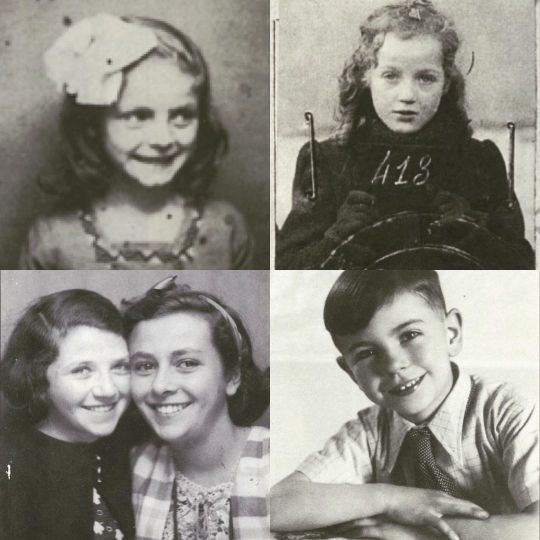
Today is #InternationalHolocaustRemembranceDay. The following are photos of just a few of the French Jewish children and teens deported from Vichy France and murdered - along with a very small number who survived. Many had been born in France. Some had fled there from Nazi-occupied areas. Many were separated from their parents and siblings before deportation. 1, starting from top left: Simone Kastenbaum, 1933-1942. Anny-Yolande Horowitz, 1933-1942. Anna Birbraer and Therese Barbanel, friends; both deported in 1942 at about 16yo. Henri Weinberg, 1932-1942. 2: Jeanine Stickgold, 1926-1942. Georges Klein, 1929-1943. 3: Jean-Pierre Guckenheimer, b. 1935, with his father Ernst. They were deported and killed with mother Herta and grandfather Markus in 1943. The Bonnem siblings Berthold, 17, Edith, 15, and Rudolf, 13. They lived in Alençon and were deported in 1943. Charlotte Schumann, 1931-1944. 4: Joseph Neuhaus, 1925-1942. Marthe Roos, 1926-1942. She was deported with her parents, Erna and Louis. Jeanine Heimer, 1929-1943. Jean Bajczman, 12, arrested in Vel d'Hiv roundup. 5: Liliane Segal was 9 when she was deported with her mother, Lucienne, in 1944. Michel Sikora, 1935-1943. 6: Simone Zwirn, 1931-1942. Maurice Horn, 1928-1942. 7: Rachel Szymcowicz, 1931-1942. Maurice Zeliszewski, b. 1925, in Paris. Arrested during the Vel d'Hiv roundup, deported 1942. Léon Berkman was born in Warsaw, arrested in Vel d'Hiv at 16. Hadassa Grynszpan, 1927-1942. 8: Léopold Berger was born in Berlin in 1926. He was 16 years old when he was deported on March 6, 1943. Colette Ewselmann was born in 1926 in Nice. She was deported with her parents in 1943. 9: Jacqueline Osman, 1933-1944. Aline Korenbajzer was not yet 3 when deported in 1942. 10: Sylvain Kozubski, 1938-1942. Monique Adelski, 1938-1944. From Serge & Beate Klarsfeld’s book, “French Children of the Holocaust”, viewable at https://phdn.org/archives/holocaust-history.org/klarsfeld/French%20Children/html&graphics/F012.shtml. #children #genocide #neveragain #neveragainisnow #holocaust #holocaustmemorial #holocausteducation #holocaustremembranceday #antisemitism #bigotry #antifascism #racism #nazism #france https://www.instagram.com/p/CKjlF9cMTNT/?igshid=11ir3ep1b71wd
#internationalholocaustremembranceday#children#genocide#neveragain#neveragainisnow#holocaust#holocaustmemorial#holocausteducation#holocaustremembranceday#antisemitism#bigotry#antifascism#racism#nazism#france
1 note
·
View note
Text
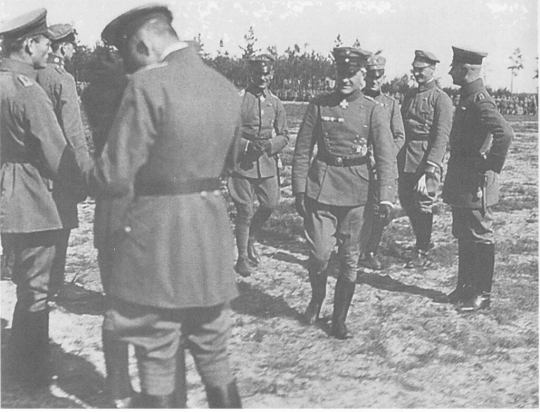
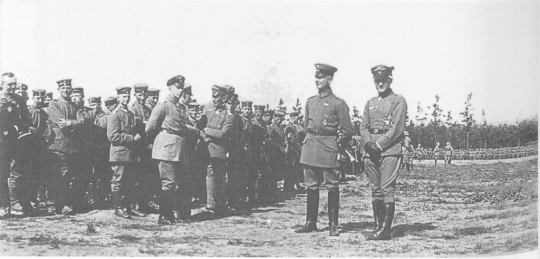
Manfred von Richthofen and Rudolf Berthold during the Kaisers visit to the front, 1917.
32 notes
·
View notes
Text
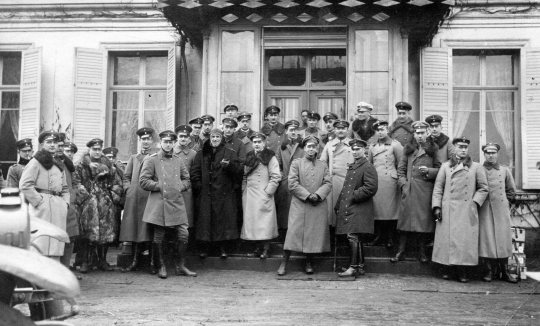
Photo of pilots altogether, I can't remember what exactly this occasion was. Manfred von Richthofen, Rudolf Berthold, Carl Bolle, and Martin Zander are the only ones I recognize.
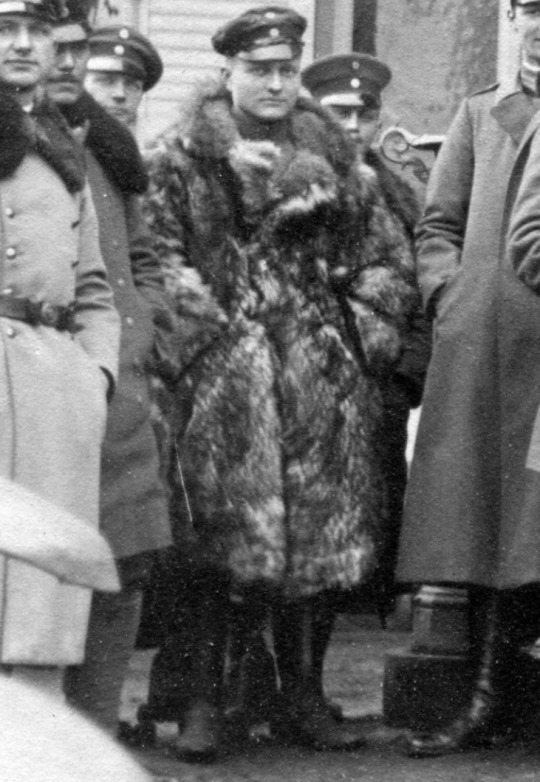
MvR
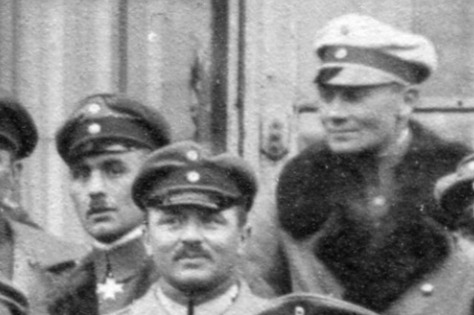
Berthold (with the PLM) und Bolle (Light coloured cap)
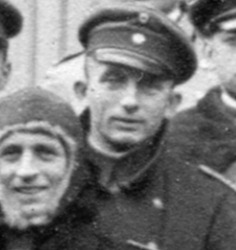
And Zander :-)
79 notes
·
View notes
Text
The most beautiful day of my life!
4 October 1914
Autumn is already making itself quite noticeable: It is cold and wet and rainy. There is also a lot of fog. We finally moved into houses, it was unbearable in the tents. Flying consumes so much energy. That's why I'm not really angry about the short break. Our bird is not flying any more, the engine has been on another plane for days to make it fly. With this in mind, the telephone called me my leader Vogel von Falckenstein to the ADK. The reason and purpose was not given, I was thinking of a new order and was in great worry because the plane was not yet ready ... In the presence of all the officers of his staff, Exz. v. Bülow presented me with the Iron Cross 1st Class!
The most beautiful moment in my life so far! Do I need to mention that I cried with joy, that I grabbed my chest more often, whether it was reality or just a beautiful dream? I am overjoyed ... The E.K.1 and for what? That I flew, flew constantly, even when the weather was bad. For having made the decisive report at the Marne, the decisive report before Reims! That I never returned from a flight without results and that all my reports were correct and important! I was only doing my duty, which forces people to disregard the personal when the general good is at stake. I want to be strong and, when the bullet hits me, I want to fall in the knowledge: "I have done my duty.” Prince August Wilhelm of Prussia pinned the cross on me. My hands were literally shaking! A Hohenzollern! I don't just know the prince externally, I got to know him as a person. Not in the ballroom, not at the parade, here in the field, man speaks to man. For weaklings, courtiers and sycophants there is only one submissiveness. They are not to be found here, where great dying makes people great! True humanity, the inner strength, is what I respect, honor, revere and love in the young Zollern. Not the outer purple, the inner royal type, the nobility of soul. Zollernart!
10 October 1914
Tomorrow we're going to Germany! Germany, my Germany! You, who aren't out here, don't know what it means to long for home! I probably won't close my eyes tonight and count the hours. I leave at 6 a.m.! So I can really see Germany again! How did it come about? The day before yesterday a pilot crashed dead for unknown reasons. He flew in a new bird, the same type, same series that we have. My pilot can no longer be persuaded to continue flying. He wants to get a new machine from the factory. We then fly it from Frankfurt or Cologne directly to the field, as rail transport takes weeks.
3 notes
·
View notes
Photo

1918 08 Fokker DVII Rudolf Berthold - Enzo Maio - box art ESCI-ERTL
26 notes
·
View notes
Text
The Adventures of Baron Munchausen (1989) Review

"Your reality, sir, is lies and balderdash and I'm delighted to say that I have no grasp of it whatsoever."
The Adventures of Baron Munchausen is one of the biggest flops in cinema history. Its failure is something that still haunts director Terry Gilliam to this day. But is the film itself actually bad?
Let's find out.
[Warning: This review contains spoilers]
Written by Gilliam and his Brazil co-writer Charles McKeown (who also plays Adolphus) and loosely based on the book Baron Munchhausen's Narrative of his Marvellous Travels and Campaigns in Russia by Rudolf Erich Raspe (itself based on the tall tales told by Hieronymus Karl Friedrich, Freiherr von Münchhausen, a German nobleman who fought in the Russo-Turkish War of 1735–1739), The Adventures of Baron Munchausen was the third and final entry in Gilliam's Trilogy of Imagination, which also included Time Bandits and Brazil. According to the man himself, all three were about the "craziness of our awkwardly ordered society" and the desire to escape it through imagination at different stages in life: a child in Time Bandits, a man in his thirties in Brazil, and finally an elderly man in this film.
Not surprisingly for a Terry Gilliam film, The Adventures of Baron Munchausen suffered through a notoriously troubled production which saw the film's already hefty budget skyrocket (although Gilliam denies it ever went anywhere near the reported $46 million). Sarah Polley, who was only 9-years-old when she played the Baron's unwanted sidekick Sally, found the entire ordeal deeply traumatising while Eric Idle, Gilliam's friend and fellow Python, described the whole experience as "fucking madness" and that one should only see Terry Gilliam films, not actually star in them.
But as bad as the production was, Gilliam has argued that it wasn't the complete horror show it was made out to be. Most of the negative stories were the result of studio politics with The Adventures of Baron Munchausen becoming the unfortunate victim of a regime change at Columbia Pictures that saw Dawn Steel replace David Puttnam as CEO. Steel wasn't interested in making a success of any of the films started by her predecessor and gave the film a limited released (only 117 prints according to Gilliam) with almost no promotion. To the surprise of no one, the film tanked, making only $8 million, with the blame for the film's failure pinned solely on the director.

Like so many box office failures, The Adventures of Baron Munchausen gained the reputation of being something of a turkey in the years following its release. This was rather unfair since The Adventures of Baron Munchausen is in no way a bad film. I don't think it is some misunderstood masterpiece, and it is unquestionably the weakest instalment of Gilliam's Imagination Trilogy, but as a standalone piece of fantasy cinema, The Adventures of Baron Munchausen is actually really rather pretty good.
The film opens in an unnamed European town, currently under siege by the Ottomans, sometime in the late 18th century (a Wednesday to be exact). It is the Age of Reason, a time of logic and rational thought, here personified by the town's mayor, and the closest thing this film has to a villain, Horatio Jackson (Jonathan Pryce). This is a man who wants to run a nice orderly war and has soldiers executed for being too extraordinarily brave because it sets a bad example. As the town is bombarded by canons, a group of actors put on a play about the life and adventures of that notorious teller of tall tales, Baron Munchausen (John Neville). Just as the second act is getting underway who should appeared in the audience but the real Baron himself. Now horribly old and longing for the sweet embrace of death, the Baron is none too happy with how he is being portrayed and proceeds to tell everyone how it really happened.
The Adventures of Baron Munchausen is the kind of lavish, fantastical adventure film that studios don't really make any more. Hell, even at the time it was released, 30 years ago today, it was the kind of lavish, fantastical adventure film that studios don't really make any more. It's the ideal film for such a creative filmmaker as Terry Gilliam. Like the Baron, he also delights in telling tall tales with little care for how realistic they are or how much sense they make. This is his greatest strength as a director as well as his biggest weakness. Gilliam is one of cinema's great visualists, possessing imagination that few can match, but at the same time he's maybe not one of its best storytellers. Many of his films have a rambling, episodic quality to the film and The Adventures of Baron Munchausen is no different.
There is some semblance of a plot about the Baron finding his old servants in order to save the town and defeating the Turks, but it's really just an excuse for sending the Baron and Sally from one fantastical world to the next and for the director to let his creatively run wild. With no one to hold him back, Gilliam indulged himself to the fullest with this film, embracing the Baron’s far fetched flights of fancy with absolute relish. From the clockwork lunacy of the moon to the heavenly grandeur of Vulcan and Venus' ballroom, the whole thing is a feast for the senses (well, two of them at least).
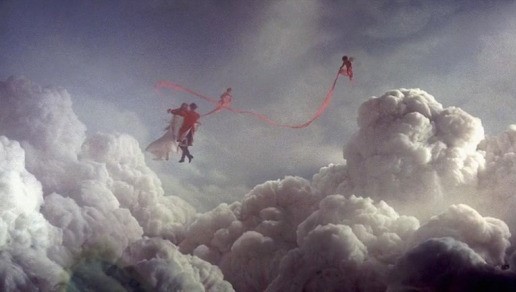
The cast is something of a mixed bag. Neville is wonderful as Baron, bringing the right mix of charm, theatricality and matter of fact-ness to one of literature's most absurd creations. I love that Oliver Reed plays the god Vulcan like a Northern factory boss, forever at war with his disgruntled workers, while Robin Williams (who went uncredited and unpaid) is at his most manic as the King of the Moon. It's a shame, though, that the film never seems bothered about doing anything remotely interesting with any of its female characters, a problem shared by almost all of Gilliam's films. Polley is saddled with a character who seems to do nothing but nag and complain, Uma Thurman (as the goddess Venus) is just there to be admired by everyone, while the rest have nothing better to do than swoon over the inexplicably irresistible Baron.
Time Bandits and Brazil were both notable for having pretty dour endings. Gilliam famously had to fight tooth and nail to get Brazil released without the studio's preferred "happy ever after" ending. For a bit it looked as if The Adventures of Baron Munchausen would continue this trend. After saving the town by driving away the Sultan's army, the Baron is assassinated by Jackson, allowing the Grim Reaper to finally get his boney hands on the man who has eluded him all throughout the film. But just as he is being given a hero's burial, we jump right back to the theatre and discover that this has all just been another one of the Baron's outrageous stories, and not even the first one in which he died. None of it really happened. Except that it did, because the Turks were defeated and the town saved. Which make no sense, but then it wouldn't really be a Baron Munchausen story if it made any sense. And so Gilliam ends this unofficial trilogy on a more uplifting and triumphant note, showing us that while imagination can offer one person salvation in the darkest of times, an imagination shared, through stores, can help save others as well.

Notes and Quotes
--Yes, that is Sting as the solider who gets executed for being too extraordinary. He landed the role because he was Gilliam's neighbour at the time.
--Where does the Baron get all those fresh roses he keeps handing out to all the beautiful ladies he meets?
--It was a brilliant move on Gilliam's part to cast Pryce, the daydreaming hero of Brazil, as this film's bureaucratic villain.
--To the surprise of no one, Oliver Reed spent most of his time on set getting drunk and trying to seduce the teenage Uma Thurman. This was actually her first acting role, but because of the numerous production delays she made two other films before this one was even released.
--As bad as the making of this film was, it still sounds like a absolute picnic compared to the making of The Abyss, that other big budget box office failure of 1989.
Sultan: "Have you any famous last words?"
Baron Munchausen: "Not yet."
Sultan: "'Not yet?' Is that famous?"
Baron Munchausen: "Abandon ship!"
Berthold: "I think the ship's abandoning us."
Horatio Jackson: We can't start escaping at a time like this. What would future generations think of us?
Baron Munchausen: "Go away! I'm trying to die!"
Sally: "Why?"
Baron Munchausen: "Because I'm tired of the world and the world is evidently tired of me."
Sally: "But why? Why?"
Baron Munchausen: "Why, why, why! Because it's all logic and reason now. Science, progress, laws of hydraulics, laws of social dynamics, laws of this, that, and the other. No place for three-legged cyclops in the South Seas. No place for cucumber trees and oceans of wine. No place for me."
King of the Moon: "My kingdom for a handkerchief!"
Baron Munchausen: "Everyone who had a talent for it lived happily ever after."
Baron Munchausen: "I'm Baron Munchausen!"
Berthold: "That sounds nasty. Is it contagious?"
Three out of four tall tales.
Mark Greig has been writing for Doux Reviews since 2011
#The Adventures of Baron Munchausen#Terry Gilliam#John Neville#Sarah Polley#Eric Idle#Jonathan Pryce#Oliver Reed#Uma Thurman#Robin Williams#Doux Reviews#Movie Reviews
3 notes
·
View notes